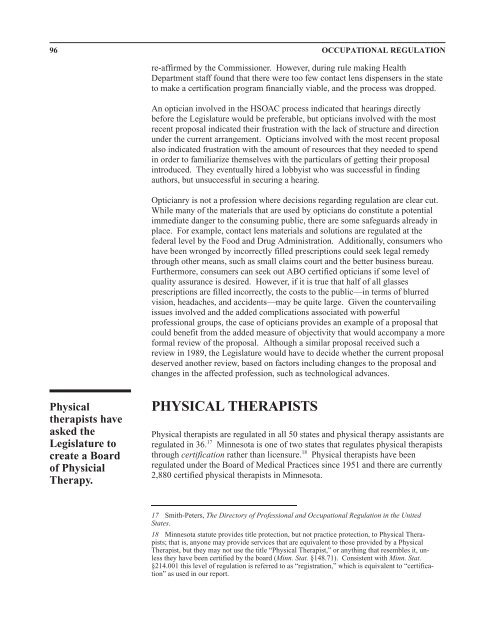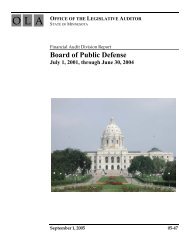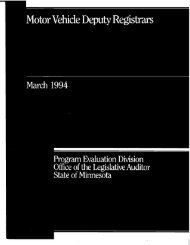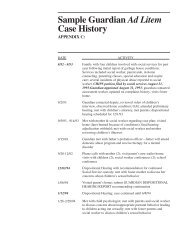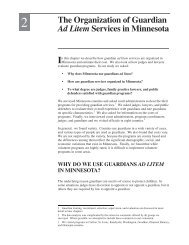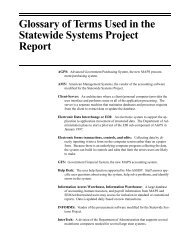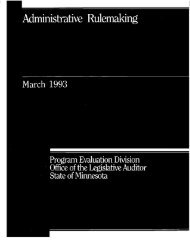Occupational Regulation - Office of the Legislative Auditor
Occupational Regulation - Office of the Legislative Auditor
Occupational Regulation - Office of the Legislative Auditor
Create successful ePaper yourself
Turn your PDF publications into a flip-book with our unique Google optimized e-Paper software.
96 OCCUPATIONAL REGULATION<br />
re-affirmed by <strong>the</strong> Commissioner. However, during rule making Health<br />
Department staff found that <strong>the</strong>re were too few contact lens dispensers in <strong>the</strong> state<br />
to make a certification program financially viable, and <strong>the</strong> process was dropped.<br />
An optician involved in <strong>the</strong> HSOAC process indicated that hearings directly<br />
before <strong>the</strong> Legislature would be preferable, but opticians involved with <strong>the</strong> most<br />
recent proposal indicated <strong>the</strong>ir frustration with <strong>the</strong> lack <strong>of</strong> structure and direction<br />
under <strong>the</strong> current arrangement. Opticians involved with <strong>the</strong> most recent proposal<br />
also indicated frustration with <strong>the</strong> amount <strong>of</strong> resources that <strong>the</strong>y needed to spend<br />
in order to familiarize <strong>the</strong>mselves with <strong>the</strong> particulars <strong>of</strong> getting <strong>the</strong>ir proposal<br />
introduced. They eventually hired a lobbyist who was successful in finding<br />
authors, but unsuccessful in securing a hearing.<br />
Opticianry is not a pr<strong>of</strong>ession where decisions regarding regulation are clear cut.<br />
While many <strong>of</strong> <strong>the</strong> materials that are used by opticians do constitute a potential<br />
immediate danger to <strong>the</strong> consuming public, <strong>the</strong>re are some safeguards already in<br />
place. For example, contact lens materials and solutions are regulated at <strong>the</strong><br />
federal level by <strong>the</strong> Food and Drug Administration. Additionally, consumers who<br />
have been wronged by incorrectly filled prescriptions could seek legal remedy<br />
through o<strong>the</strong>r means, such as small claims court and <strong>the</strong> better business bureau.<br />
Fur<strong>the</strong>rmore, consumers can seek out ABO certified opticians if some level <strong>of</strong><br />
quality assurance is desired. However, if it is true that half <strong>of</strong> all glasses<br />
prescriptions are filled incorrectly, <strong>the</strong> costs to <strong>the</strong> public—in terms <strong>of</strong> blurred<br />
vision, headaches, and accidents—may be quite large. Given <strong>the</strong> countervailing<br />
issues involved and <strong>the</strong> added complications associated with powerful<br />
pr<strong>of</strong>essional groups, <strong>the</strong> case <strong>of</strong> opticians provides an example <strong>of</strong> a proposal that<br />
could benefit from <strong>the</strong> added measure <strong>of</strong> objectivity that would accompany a more<br />
formal review <strong>of</strong> <strong>the</strong> proposal. Although a similar proposal received such a<br />
review in 1989, <strong>the</strong> Legislature would have to decide whe<strong>the</strong>r <strong>the</strong> current proposal<br />
deserved ano<strong>the</strong>r review, based on factors including changes to <strong>the</strong> proposal and<br />
changes in <strong>the</strong> affected pr<strong>of</strong>ession, such as technological advances.<br />
Physical<br />
<strong>the</strong>rapists have<br />
asked <strong>the</strong><br />
Legislature to<br />
create a Board<br />
<strong>of</strong> Physicial<br />
Therapy.<br />
PHYSICAL THERAPISTS<br />
Physical <strong>the</strong>rapists are regulated in all 50 states and physical <strong>the</strong>rapy assistants are<br />
regulated in 36. 17 Minnesota is one <strong>of</strong> two states that regulates physical <strong>the</strong>rapists<br />
through certification ra<strong>the</strong>r than licensure. 18 Physical <strong>the</strong>rapists have been<br />
regulated under <strong>the</strong> Board <strong>of</strong> Medical Practices since 1951 and <strong>the</strong>re are currently<br />
2,880 certified physical <strong>the</strong>rapists in Minnesota.<br />
17 Smith-Peters, The Directory <strong>of</strong> Pr<strong>of</strong>essional and <strong>Occupational</strong> <strong>Regulation</strong> in <strong>the</strong> United<br />
States.<br />
18 Minnesota statute provides title protection, but not practice protection, to Physical Therapists;<br />
that is, anyone may provide services that are equivalent to those provided by a Physical<br />
Therapist, but <strong>the</strong>y may not use <strong>the</strong> title “Physical Therapist,” or anything that resembles it, unless<br />
<strong>the</strong>y have been certified by <strong>the</strong> board (Minn. Stat. §148.71). Consistent with Minn. Stat.<br />
§214.001 this level <strong>of</strong> regulation is referred to as “registration,” which is equivalent to “certification”<br />
as used in our report.


